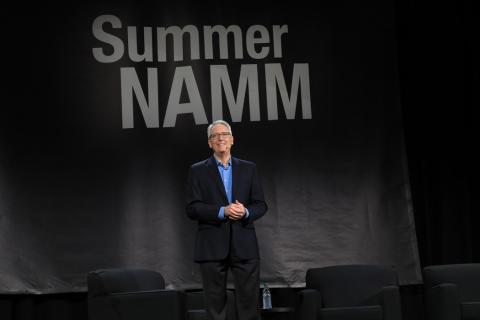
After no in-person gatherings last summer, 2020, or this past January, there certainly has to be some curiosity as to what things look like on the other side of a worldwide pandemic that kept people around the globe locked inside, including musicians who suddenly had no gigs, no venues to go to, and certainly a monumental challenge of "can I continue to sustain a career in this industry." Not to mention, with so many businesses impacted by what we all went through, how did they alter their operations to keep going.
In this special episode that features audio recorded on-location at the Summer NAMM Show in Nashville just under two weeks ago, views are presented on the state of the music recording industry, including insights from Joe Lamond, the President and CEO of the National Association of Music Merchants as well as guests that he welcomed on-stage during the opening session, representing manufacturers, merchants, etc., and you'll hear from an artist who gave his perspective on coming through the pandemic.
(Joe Lamond) "The last year proved, when people are tested they turn to music, as they always have."
(Joe Lamond) "When I look at us now, the survivors, I actually see the most hardened group of generals and ladies and gentlemen, I think you are THE new greatest generation."
(Joe Lamond) "I don't want to let a crisis go to waste. One of my fears is we forget the lessons of this last 18 months."
(Sammy Ash) "The first thing we had to get over was ourselves."
(Sammy Ash) "The next thing I know is, 85 percent of my company is shut down. So, we had to get our mindset positive."
(Sammy Ash) "It's very simple, if I had more gear I could sell more gear... Profits went up because deals went down. If you had an instrument, you sold it. Since everybody was buying everything, we moved stuff that normally wouldn't have moved."
(Joe Lamond) (to Sammy Ash) "You used the phrase that your guitar wall looked like the toilet paper aisle at Costco last April."
(Laura Penrose) "Everyone rents when the economy is bad. People buy when the economy's good... But we did not plan for when the economy stops."
(Laura Penrose) "We really pushed our staff to change the entire way they had thought of their jobs. And, it was challenging."
(Jamie Deering) "I've been through pretty much everything a CEO would possibly experience in their entire career, in twelve months."
(Jamie Deering) "We got a week away from having nothing left to ship out when California let manufacturing open again. We were so lucky."
(Chris Martin) "Sometimes you have to hit the wall a couple times to realize, no, it's impenetrable. It's time to find a different direction."
(Chris Martin) "I've seen these booms and they're generally fueled by music and/or musicians, and usually both... I think this boom is fueled by boredom... and I hope I'm wrong."
(Chris Martin) "A good brand is only as good as the products that the brand represents."
(Barbara Wight) "During the pandemic none of us could do anything but manage the crisis."
(Barbara Wight) "For us it was probably the hardest year we've ever had in business."
(Joe Lamond) "We had musical instrument companies that, after the initial pandemic, all of a sudden were having the best year - record year - ever. And then anyone involved in live music or concerts or festivals or schools were not. So, it was very difficult."
(Justin Emord) "There was definitely a period early on (in the pandemic) where I did feel (his music career might be over) for a minute... But that was quickly hit with a firm realization of who I am as a person and what music means to me."
(Justin Emord) "That was also a very encouraging, motivating moment during the pandemic, where there wasn't a lot of activity, not a lot of action going on. But, when they sent me that email saying, 'Congratulations, you're now part of the (Recording) Academy. Your card is in the mail,' that was, like, one of the coolest moments I've had in a long time."
(Justin Emord) "During the pandemic there was a lot of questionable moments of, I can't get a spark because the whole process was changed... With the pandemic that was a silver lining for me, was to express myself creatively in a different way. And so I went to Joshua Tree and did some milky way photography and I came back to work on some music... and I was just writing differently and approaching songs and bass lines differently and I think a lot of that has to do with thinking outside the box with the way astrophotography is... It forced my brain to think differently, so I was able to approach the songwriting process differently."
